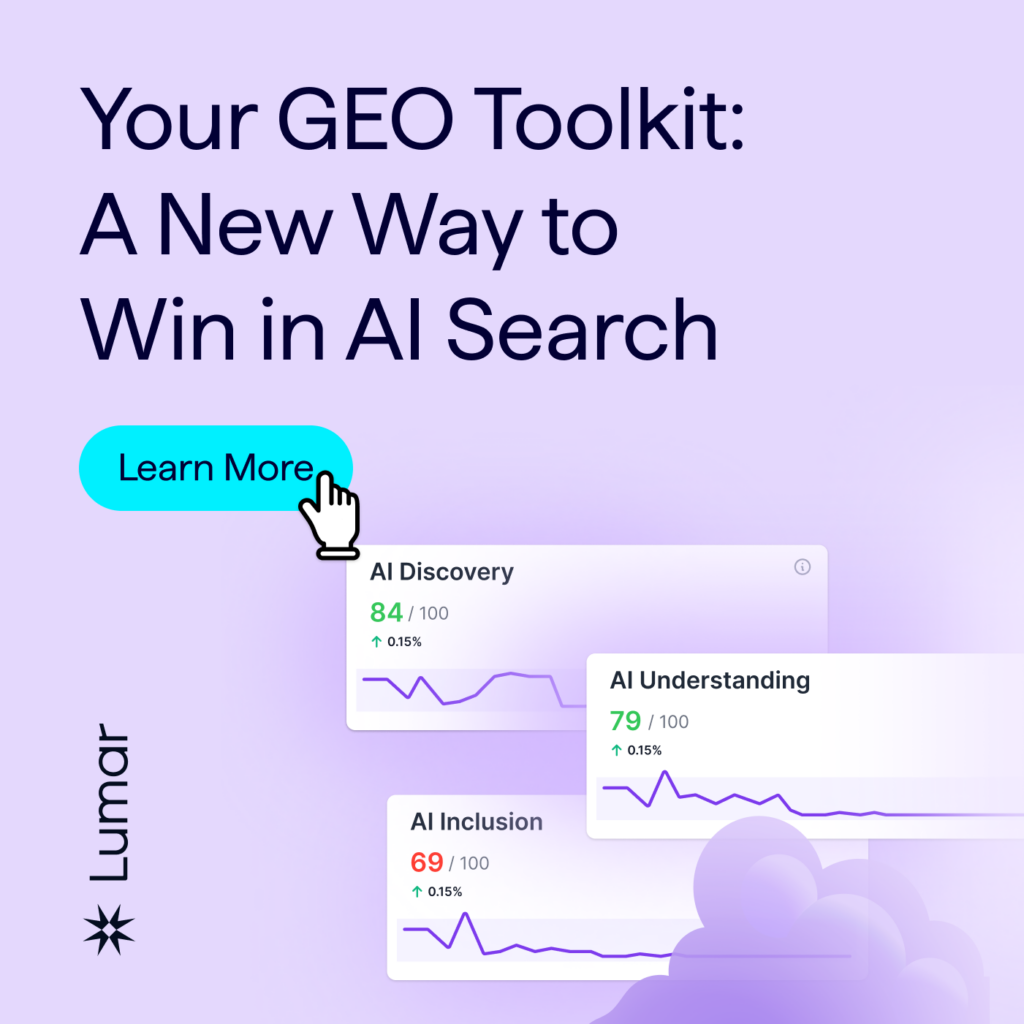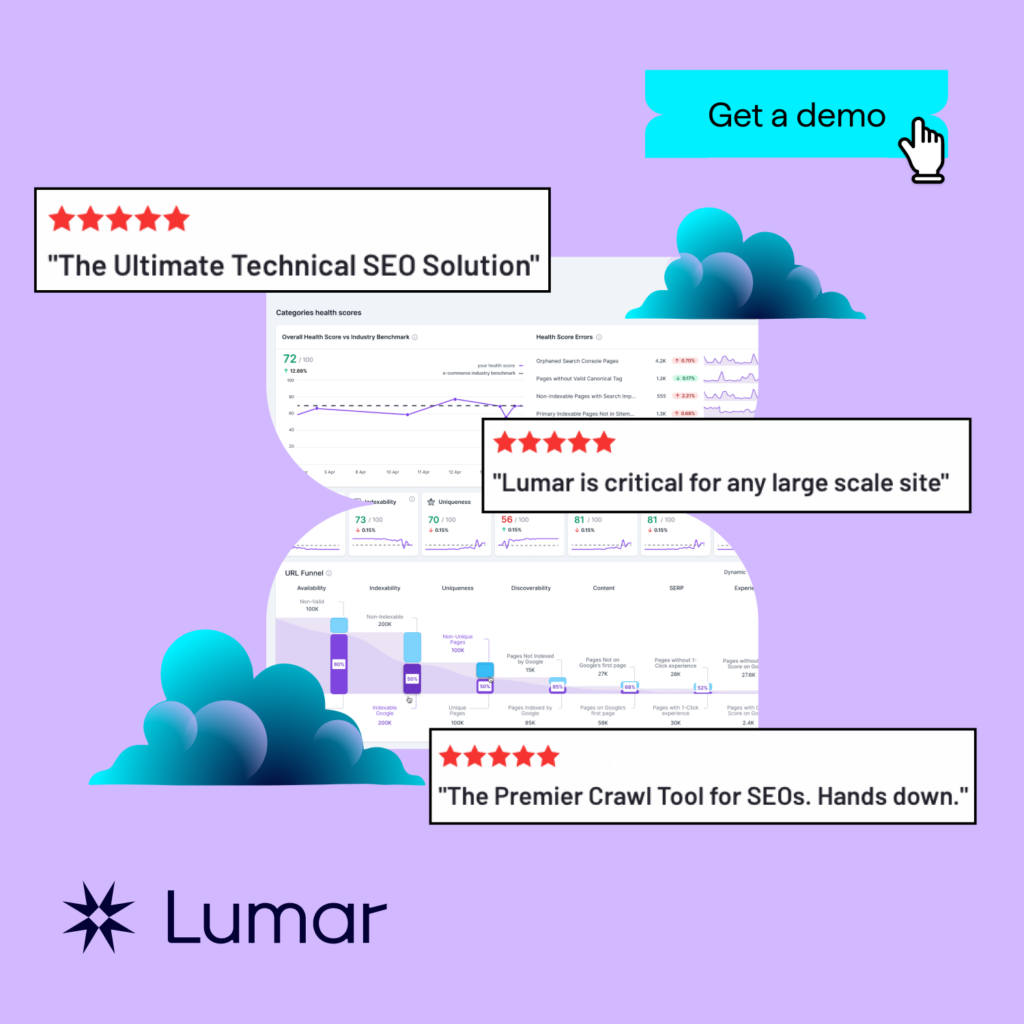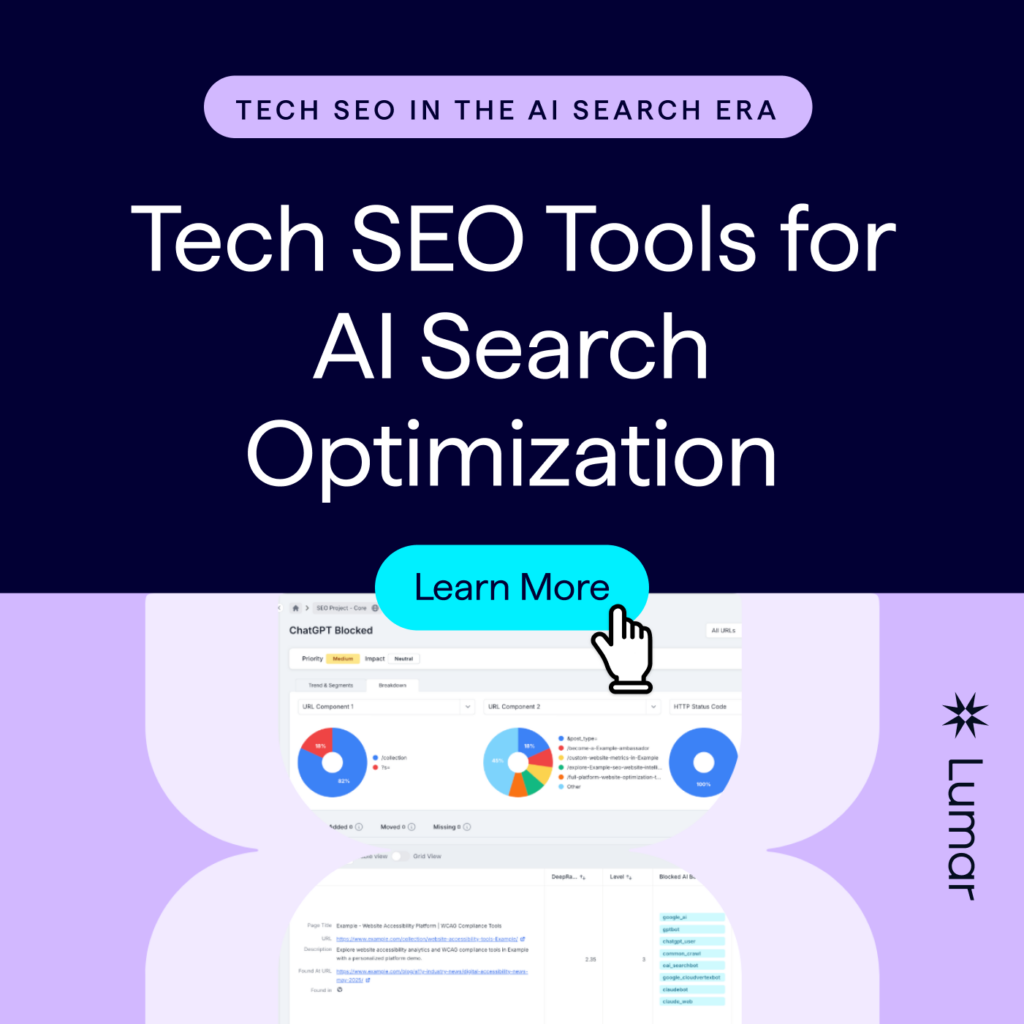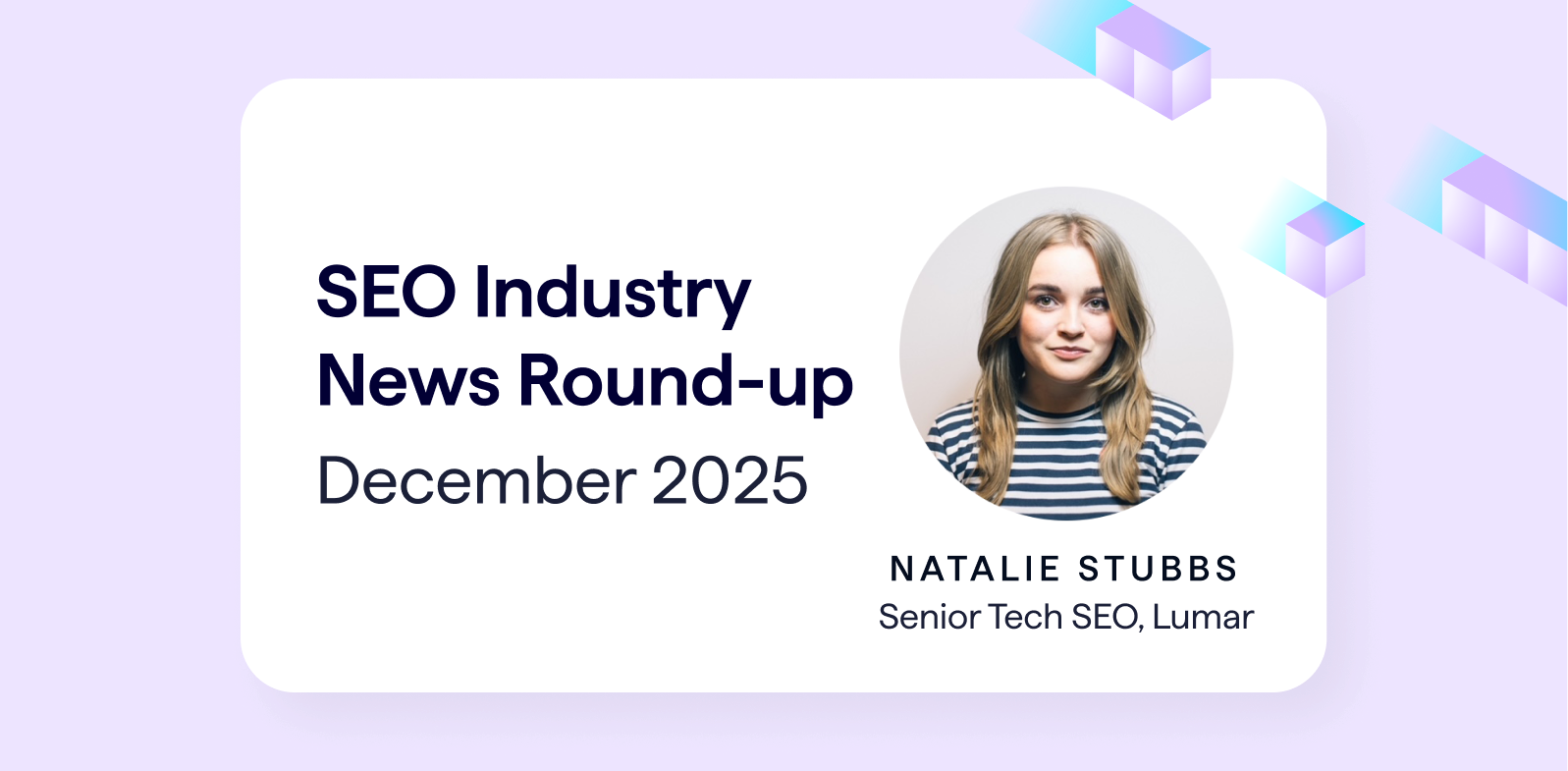On episode 3 of Lumar’s Human-First Digital podcast, Senior Technical SEO Chris Spann is joined by Dan Taylor, Head of Technical SEO and Partner at Salt.agency.
These technical SEO experts discuss AI search, why marketing leaders need to understand Google’s AI Overviews / SGE, and how EEAT and structured data / schema markup play a role in optimizing your website content for AI search.
Listen to the full interview below or on your favorite podcast app — or read on for a preview of their conversation and some key takeaways.
Where to listen & subscribe to the Human-First Digital Podcast
Don’t forget to subscribe to the Human-First Digital podcast on Spotify or any other podcast player of choice to stay up-to-date with the latest insights and news from the world of SEO and website optimization.
Episode timestamps
- 00:00:32 – Building a Career in Technical SEO
- 00:07:48 – Google SGE & AI Overviews
- 00:09:15 – Different Approaches to Managing AI in Search
- 00:09:57 – Structured Data for AI Search; Going Beyond Rich Snippets
- 00:11:09 – “SERP Decorations” and Schema Markup
- 00:12:03 – EEAT and How to Communicate Expertise to Google
- 00:13:15 – Author Authority and Schema Markup
- 00:14:35 – Entity Identification in Search
- 00:15:56 – The Importance of Trust and EEAT for Securing AI Overviews
- 00:19:03 – Optimizing Images for the Future of Search
Episode 3 Recap:
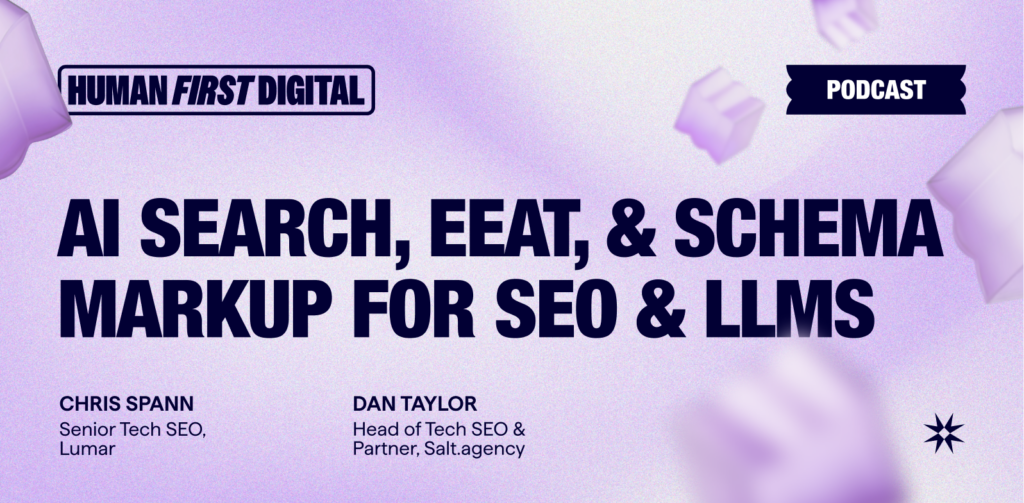
“It’s going to be a conversation about brand intelligence. With entities, it’s going to be more important how we structure schema. I said last week at a conference: it’s defining and aligning brand messaging, corroborating on brand message, and making sure there are as many cooccurrences of brand and topic as possible – not just on the inside, but external as well.”
— Dan Taylor, Head of Technical SEO and Partner at Salt.agency
[Note: Podcast transcript excerpts may be slightly edited for clarity and context.]
Google SGE, AI Overviews, & SEO
CHRIS: Your talk today [at BrightonSEO] is about SGE [Search Generative Experience] and the risks of SGE…
DAN: Sort of! So, I want to talk more about how we communicate [about SGE and AI Search], right? I’m fortunate to speak at a lot of companies on a weekly basis, and CMOs will come up to us and ask, “Oh, how are you feeling about AI and SEO?”
And I’ll start talking about SGE and other features, and they say, “Oh no, I meant ChatGPT content.”
I’m like, “Oh, do you not know this other thing’s coming?”
It’s like the dinosaurs worrying about the leaf being three feet above them while a meteor is overhead.
In general, we can drive results and fix things, but if we can’t communicate it to the right people and get understanding, there’s almost no point.
CHRIS: A couple of our clients are thinking about SGE in different ways. We’ve got one that’s going, “Oh, well there’s nothing we can do about it — best start working out how we can work alongside it.”
We’re experimenting with some clients at the moment, especially in the YMYL space, where EEAT is obviously supposed to be pretty important to Google. We work with places that have writers who are maybe not celebrities but are really well qualified to talk about the things they are producing content on.
And what we are finding is: one of their competitors [that they are struggling against in search] — when we did some gap analysis for them, the only real big difference between the two is that their competitor has the most extensive structured data I’ve ever seen.
And I think as SEOs, we worry a lot about the structured data that does things to the SERPs; stars and reviews, and all that stuff. When Google took FAQ [SERP features] away, SEOs basically said, “oh, we don’t care about FAQ schema anymore.” But maybe that shouldn’t be the case. Because we know that in their space, Google wants this stuff, right? It really heavily values ‘experience’ [as part of EEAT], but does linking to an author’s profile that says they are Harvard-educated or whatever, is that going to make a difference?
But at the same time, this is stuff that also helps you get into SGE / AI Overviews.
DAN:
So there’s probably a few layers in there to unfold.
We’ve been doing similar experiments, and I agree. So Google themselves at Search Central Live in Zurich last year, they call all the rich snippet stuff and everything else ‘SERP Decoration’. That’s what their team call it — decoration.
They took away FAQs because we [SEOs] abused the hell out of it and made it meaningless and — gone. It was bad for user experience.
But when it comes to the actual schema mapping, I think of a more extensive schema map outside of what Google uses for SERP decoration.
What Google supports for SERP decoration is one thing, but what Google reads and parses is a different thing. So, I think you need to build out as much structure as possible.
I mean, eight years ago, I used to be on the bandwagon of, like, “you don’t have to use schema for everything.” But I think, especially in the past four years and what we’ve been seeing, it’s like, yes, you will schema everything until there is no schema left.
I think that’s also why we’ve seen increases in structured data markup penalties and things like that, because Google’s trying to purge that [misuse of structured data] from the system. It relies on it.
When it comes to the EEAT elements — however many Es you want to put in there, or however any candles you want to light to the EEAT gods, I’ve always said it’s fine having somebody who is Harvard-educated [working on your content], but how does Google know they are? It’s easily falsifiable.
It’s great you’re linking to their Harvard alumni profile and other bits, that’s great, it means they’re potentially an expert. But how you establish authority and trust is through other people.
I can be ‘Head of Technical SEO’ but how I get authority and trust as such is from other people referring to me as such, or other people citing me at conferences. It’s building all that up — just saying you’re an expert is not enough, is what I’m trying to say.
And I think that’s where a lot of sites have fallen down, because they’ve fallen into the trap of, “oh, we’ll just make an author box, yeah, we’ll link to their socials.” And it’s like, all right, you validated this person is at least potentially real, but then how do you prove they’re real?
A client has some authors who also write for their competitors’ websites, and they were asking, “Do we put their author page on our competitors’ website in the ‘same as’ [in schema markup]?”
It’s an interesting conversation, right? Because, in theory, yeah, you probably should. Because if Google knows that if your author writes for Website X, a trusted brand, they are likely an expert. So if the author also writes for Site Y, another trusted brand, does [tying the author’s expertise across evidence on both sites help strengthen that connection for Google? Does that have the knock-on effect that it also helps strengthen your brand’s EEAT because the system now has stronger signals that this person writing on your site is indeed a real expert?]
You get to tie the two together and say that this person has written for these 10 websites, all of which Google has its ‘opinions’ on.
…
To hear the entire conversation, covering entities, knowledge graphs, more schema markup, and how it all may affect AI search now and in the future, tune into the full podcast episode.
Connect with this episode’s speakers
- Guest: Dan Taylor, Head of Technical SEO and Partner at Salt.agency
- Host: Chris Spann, Senior Technical SEO, Lumar


